现在完成时及现在完成进行时讲解及练习
现在完成时及现在完成进行时讲解及练习
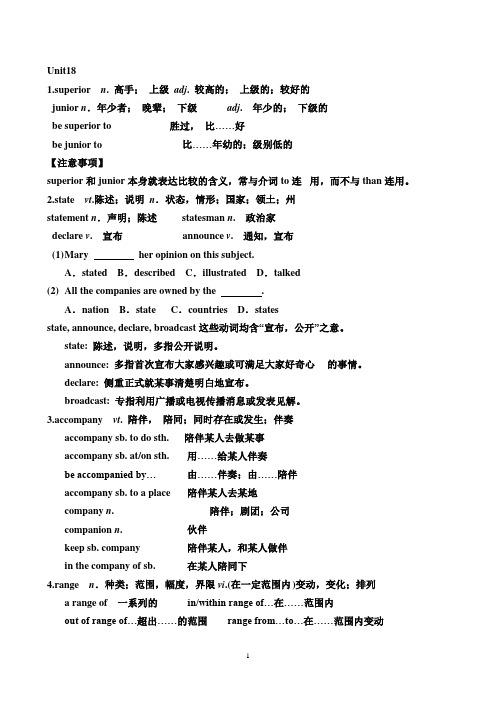
Unit181.superior n. 高手;上级adj. 较高的;上级的;较好的junior n.年少者;晚辈;下级adj. 年少的;下级的be superior to 胜过,比……好be junior to 比……年幼的;级别低的【注意事项】superior和junior本身就表达比较的含义,常与介词to连用,而不与than连用。
2.state vt.陈述;说明n.状态,情形;国家;领土;州statement n.声明;陈述statesman n. 政治家declare v. 宣布announce v. 通知,宣布(1) M ary her opinion on this subject.A.stated B.described C.illustrated D.talked(2) All the companies are owned by the .A.nation B.state C.countries D.statesstate, announce, declare, broadcast这些动词均含“宣布,公开”之意。
state: 陈述,说明,多指公开说明。
announce: 多指首次宣布大家感兴趣或可满足大家好奇心的事情。
declare: 侧重正式就某事清楚明白地宣布。
broadcast: 专指利用广播或电视传播消息或发表见解。
3.accompany vt. 陪伴,陪同;同时存在或发生;伴奏accompany sb. to do sth. 陪伴某人去做某事accompany sb. at/on sth. 用……给某人伴奏be accompanied by… 由……伴奏;由……陪伴accompany sb. to a place 陪伴某人去某地company n. 陪伴;剧团;公司companion n. 伙伴keep sb. company 陪伴某人,和某人做伴in the company of sb. 在某人陪同下4.range n.种类;范围,幅度,界限vi.(在一定范围内)变动,变化;排列a range of一系列的in/within range of…在……范围内out of range of…超出……的范围range from…to…在……范围内变动(1) These are our new __________(种类)of beauty products.(2) The shirts are sold out _____________________(在这个价位范围之内).(3) The age of the students in our school ___________(在……范围内变动)14 to 18.5.bound n.一跳,一跃adj.注定的be bound for准备去;前往be bound to do sth. 必定做某事;有责任做某事(1) You have done so much that you _________________(必定会成功).(2) We ______________________(打算回家过……)the Spring Festival.(3) I feel ___________(有必要)tell you about it.are bound to succeed are bound for home for bound to6.unlike prep.不同,不像like像……feel like 想要;意欲……look like 看起来像……;看来似乎……something like 几分像……It's like/unlike sb. to do sth.做某事,实在像/不像某人。
现在完成时与现在完成进行时态讲解及练习(含答案)
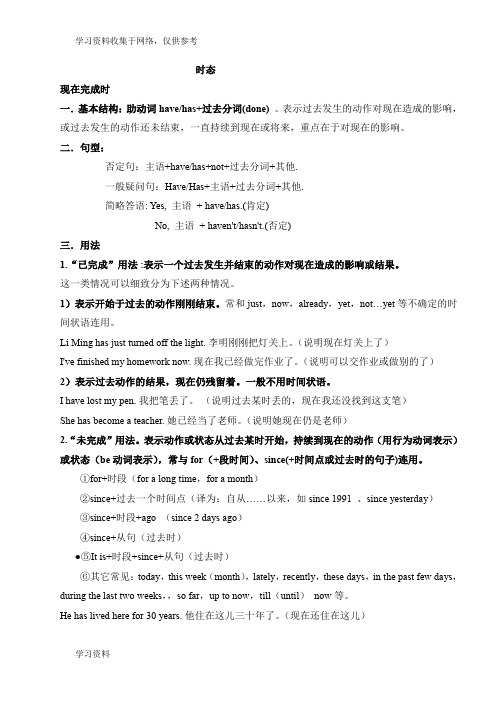
时态现在完成时一.基本结构:助动词have/has+过去分词(done) 。
表示过去发生的动作对现在造成的影响,或过去发生的动作还未结束,一直持续到现在或将来,重点在于对现在的影响。
二.句型:否定句:主语+have/has+not+过去分词+其他.一般疑问句:Have/Has+主语+过去分词+其他.简略答语: Yes, 主语+ have/has.(肯定)No, 主语+ haven't/hasn't.(否定)三.用法1.“已完成”用法 :表示一个过去发生并结束的动作对现在造成的影响或结果。
这一类情况可以细致分为下述两种情况。
1)表示开始于过去的动作刚刚结束。
常和just,now,already,yet,not…yet等不确定的时间状语连用。
Li Ming has just turned off the light. 李明刚刚把灯关上。
(说明现在灯关上了)I've finished my homework now. 现在我已经做完作业了。
(说明可以交作业或做别的了)2)表示过去动作的结果,现在仍残留着。
一般不用时间状语。
I have lost my pen. 我把笔丢了。
(说明过去某时丢的,现在我还没找到这支笔)She has become a teacher. 她已经当了老师。
(说明她现在仍是老师)2.“未完成”用法。
表示动作或状态从过去某时开始,持续到现在的动作(用行为动词表示)或状态(be动词表示),常与for(+段时间)、since(+时间点或过去时的句子)连用。
①for+时段(for a long time,for a month)②since+过去一个时间点(译为:自从……以来,如since 1991 、since yesterday)③since+时段+ago (since 2 days ago)④since+从句(过去时)●⑤It is+时段+since+从句(过去时)⑥其它常见:today,this week(month),lately,recently,these days,in the past few days,during the last two weeks,,so far,up to now,till(until)now等。
现在完成时及现在完成进行时讲解及练习

现在完成进行时1 定义:现在完成进行时表示动作从过去某一时间开始,一直延续到现在,可能还要继续下去。
2 现在完成进行时的构成:现在完成进行时是由“have/has+been+动词的现在分词”构成3 现在完成进行时的基本句型肯定式I/We have been working.疑问式Have you been working?简略回答Yes,I/we have. No,I/we haven't.肯定式He/She/It has been working.疑问式Has he/she/it been working?简略回答Yes,he/she/it has. No,he/she/it hasn't.4 现在完成时的用法1)在强调指出动作还未结束,还要继续下去。
如:I've been reading this book for two hours,but I haven't finished it. 这本书我已读了两个小时了,但我还没读完。
I've read this book.我已读完这本书了。
2)强调动作延续时间的长久或带感情色彩。
She has always been working like that.她一贯是这样工作的。
3)现在完成进行时也可表示现在以前这段时间反复发生的事情。
We've been seeing quite a lot of each other recently.最近我们经常见面。
5 相同点1. 现在完成时和现在完成进行时都可以表示从过去某一时刻开始一直延续到现在的动作.如: I have worked in this school since 2001. I have been working here since 2001.2. 现在完成时和现在完成进行时都可以表示一段时间内进行的动作.例如: Mr. Smith has taught English for 20 years. Mr. Smith has been teaching English for 20 years 6 现在完成时和现在完成进行时的区别1)现在完成进行时更强调动作的延续性,它是现在完成时的强调形式。
(完整版)现在完成时讲解及练习

(完整版)现在完成时讲解及练习Unit 9:现在完成时讲解一.基本结构:助动词have/has+过去分词(done)二.句型:否定句:主语+have/has+not+过去分词+其他.一般疑问句:Have/Has+主语+过去分词+其他.简略答语: Yes, 主语+ have/has.(肯定)No, 主语+ haven't/hasn't.(否定)三.用法(1)现在完成时表示过去发生或已经完成的动作对现在造成的影响或结果I have spent all of my money (so far).(含义是:现在我没有钱花了.)Guo zijun has (just/already) come. (含义:郭子君现在在这儿) My father has gone to work.(含义是:我爸爸现在不在这儿)(2)现在完成时可以用来表示发生在过去某一时刻的,持续到现在的动作(用行为动词表示)或状态(be动词表示)常与for(+时间段),since(+时间点或过去时的句子)连用.①for+时段②since+过去一个时间点(译为:自从……以来)③since+时段+ago④since+从句(过去时)●⑤It is+时段+since+从句(过去时)Mary has been ill for three days.I have lived here since 1998.四.has gone (to),has been (to), has been (in) 的区别Have/Has gone(to) :去了(现在不在说话现场)Where is your father?He has gone to Shanghai.Have/Has been (to) :去过(已不在去过的地方)My father has been to Shanghai.Have/has been in:呆了多久(还在所呆的地方)My father has been in Shanghai for two months. /sin ce two months ago.五.现在完成时的标志1. 现在完成时的含义之一是过去完成的动作对现在仍有影响,用以下四大标志词可以表达这种含义:* 以already, just和yet为标志He has already got her help. 他已得到她的帮助。
现在完成时及现在完成进行时讲解及练习
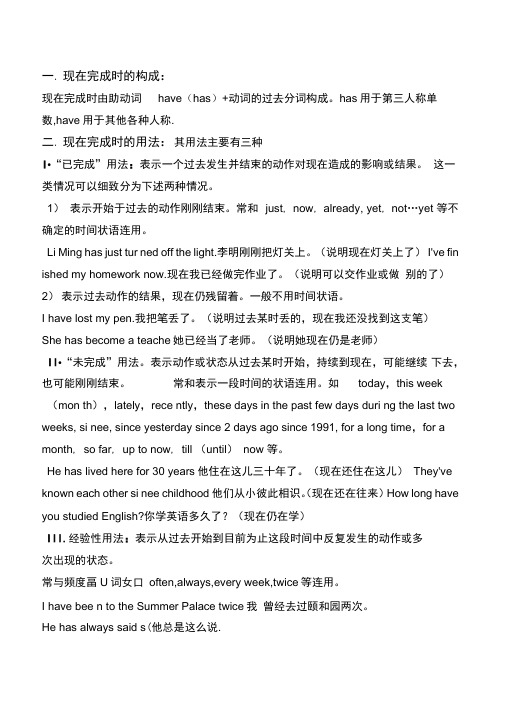
一.现在完成时的构成:现在完成时由助动词have(has)+动词的过去分词构成。
has用于第三人称单数,have用于其他各种人称.二.现在完成时的用法:其用法主要有三种I•“已完成”用法:表示一个过去发生并结束的动作对现在造成的影响或结果。
这一类情况可以细致分为下述两种情况。
1)表示开始于过去的动作刚刚结束。
常和just, now, already, yet, not…yet 等不确定的时间状语连用。
Li Ming has just tur ned off the light.李明刚刚把灯关上。
(说明现在灯关上了)I've fin ished my homework now.现在我已经做完作业了。
(说明可以交作业或做别的了)2)表示过去动作的结果,现在仍残留着。
一般不用时间状语。
I have lost my pen.我把笔丢了。
(说明过去某时丢的,现在我还没找到这支笔)She has become a teache她已经当了老师。
(说明她现在仍是老师)II•“未完成”用法。
表示动作或状态从过去某时开始,持续到现在,可能继续下去,也可能刚刚结束。
常和表示一段时间的状语连用。
如today,this week (mon th),lately,rece ntly,these days in the past few days duri ng the last two weeks, si nee, since yesterday since 2 days ago since 1991, for a long time,for a month, so far, up to now, till (until)now 等。
He has lived here for 30 years他住在这儿三十年了。
(现在还住在这儿)They've known each other si nee childhood他们从小彼此相识。
现在完成时与现在完成进行时比较练习

现在完成时与现在完成进行时比较练习一、现在完成时与现在完成进行时的比较在我们日常生活中,我们经常会遇到两种时态:现在完成时和现在完成进行时。
这两种时态在很多情况下都可以互换使用,但它们之间还是存在一定的差异。
本文将从语法结构、用法、含义等方面对现在完成时和现在完成进行时进行详细的比较和分析。
二、现在完成时的语法结构和用法1.1 现在完成时的语法结构现在完成时是由助动词“have/has”加过去分词构成的。
例如:I have eaten breakfast.(我已经吃过早餐了。
)这里的助动词“have”表示完成的动作发生在过去,而过去的分词“eaten”表示动作的完成状态。
1.2 现在完成时的用法现在完成时主要用于表示过去发生的动作对现在造成的影响,或者表示从过去一直持续到现在的动作。
它还可以用于强调过去的经历或者经验。
例如:I have lived in this city for 5 years.(我已经在这个城市住了5年了。
)这里表示从过去一直持续到现在的动作。
She has studied English for 10 years.(她学英语已经学了10年了。
)这里表示过去发生的动作对现在造成的影响。
I have seen that movie twice.(我看过那部电影两次了。
)这里表示强调过去的经历或经验。
三、现在完成进行时的语法结构和用法2.1 现在完成进行时的语法结构现在完成进行时是由助动词“have/has been + 现在分词”构成的。
例如:I have been studying English for 3 hours.(我已经学习英语3个小时了。
)这里的助动词“have been”表示从过去某个时间开始一直持续到现在的动作,而“studying”则表示动作正在进行。
2.2 现在完成进行时的用法现在完成进行时主要用于表示从过去某个时间开始一直持续到现在的动作,或者表示动作正在进行且可能还要继续下去。
现在完成时和现在完成进行时的用法及区别习题

现在完成时和现在完成进行时的用法及区别习题现在完成时和现在完成进行时谈论的都是过去开始的、现在仍在进行的行动。
这意味着两种时态都可以用 how long 来回答正在进行的动作,然而,它们的关注点略有不同:▪现在完成时:▪1、与延续性和非延续性动词一起使用▪2、关注行动的结果▪3、谈论最近完成的与现在有关的行动或经历▪▪现在完成进行时▪1、仅与延续性动词一起使用▪2、强调动作的持续时间▪3、谈论正在进行的临时行动或新习惯▪一、选择正确的答案完成下面的句子1、_____your new car yet?a、Have you bought b、Have you been buying2、Our teacher _____more than a dozen exam papers up to now.a、has checked b、has been checking3、I _____to many counties so far.a、have travelled b、have been travelling4、I _____my key, I cannot find it.a、have lost have been losing5、It _____non-stop for more than an hour now.a、has rained b、has been raining6、Sara _____for you for a long time; where have you been?a、has been waiting b、has waited7、Brya _____Spanish for three years.a、has been learning b、has learned8、How long _____the piano? "Since I was 5."a、have you been playing b、have you played9、Mariamy _____ lost wallet.a、has found b、has been finding10、We _____you for ages.a、hasn't seen b、hasn't been seeing11、My dad _____in the same company for more than twenty years.a、has been working b、has worked12、My patience _____to anend.a、has come b、has been coming13、How long _____TV, your eyes look so red.a、have you been watching b、have you watched14、I _____for over eight hours now. I am extremely tired.a、have driven b、have been driving15、The jury _____a verdict after three hours.a、has reached b、has been reaching二、答案及解析1、Have you bought解析:yet 是现在完成时的信号词,因此这里选 Have you bought。
初中英语语法一般现在完成进行时专项讲解及练习

初中英语语法一般现在完成进行时专项讲解及练习一、一般现在完成进行时的构成一般现在完成进行时是由“have/has been + 动词-ing”的形式构成。
表示动作或状态开始于过去某一时刻,持续到现在,并可能继续下去。
构成:主语 + have/has + been + 动词-ing二、一般现在完成进行时的用法1. 表示持续的动作或状态:主语 + have/has + been + 动词-ing- I have been ___.(我已经研究英语三年了。
)- They have been waiting for the bus for an hour.(他们已经等车等了一个小时了。
)2. 表示最近发生的动作:主语 + have/has + just + been + 动词-ing- He has just been ___.(他刚刚看了一部电影。
)- We have just been ___.(我们刚刚踢完足球。
)3. 表示经验或多次重复的动作:主语 + have/has + ever/never + been + 动词-ing- Have you ever been ___?(你曾经在海里游泳过吗?)- She has never been skiing.(她从未滑过雪。
)三、一般现在完成进行时的练1. 用所给单词的适当形式填空:- I ____________ (wait) here for half an hour.- They ____________ (study) for the test all morning.- We ____________ (just finish) eating dinner.- He ____________ (play) basketball since he was seven years old.2. 根据句意和括号内的提示填空:- How long ____________ they ____________ (learn) French? - They have been learning French for three years.- The dog ____________ (chase) its tail for the past ten minutes.- She ____________ (work) on this project since morning.- We ____________ (talk) for hours and we still have a lot to say.3. 改错题:- I has been living in this city since I was born. (改为“I have been living in this city since I was born.”)- They have just been buy new ___(改为“They have just been___.”)四、总结一般现在完成进行时是用来描述从过去某一时刻开始一直持续到现在的动作或状态。
(word完整版)(新)现在完成时现在完成进行时
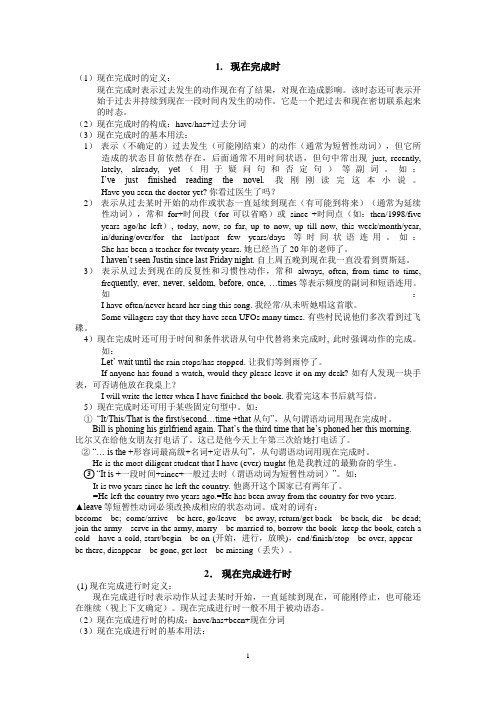
1.现在完成时(1)现在完成时的定义:现在完成时表示过去发生的动作现在有了结果,对现在造成影响。
该时态还可表示开始于过去并持续到现在一段时间内发生的动作。
它是一个把过去和现在密切联系起来的时态。
(2)现在完成时的构成:have/has+过去分词(3)现在完成时的基本用法:1)表示(不确定的)过去发生(可能刚结束)的动作(通常为短暂性动词),但它所造成的状态目前依然存在,后面通常不用时间状语,但句中常出现just, recently, lately, already, yet(用于疑问句和否定句)等副词。
如:I’ve just finished reading the novel. 我刚刚读完这本小说。
Have you seen the doctor yet? 你看过医生了吗?2)表示从过去某时开始的动作或状态一直延续到现在(有可能到将来)(通常为延续性动词),常和for+时间段(for可以省略)或since +时间点(如:then/1998/five years ago/he left), today, now, so far, up to now, up till now, this week/month/year, in/during/over/for the last/past few years/days等时间状语连用。
如:She has been a teacher for twenty years. 她已经当了20年的老师了。
I haven’t seen Justin since last Friday night. 自上周五晚到现在我一直没看到贾斯廷。
3)表示从过去到现在的反复性和习惯性动作,常和always, often, from time to time, fre quently, ever, never, seldom, before, once, …times等表示频度的副词和短语连用。
现在完成时与现在完成进行时比较练习
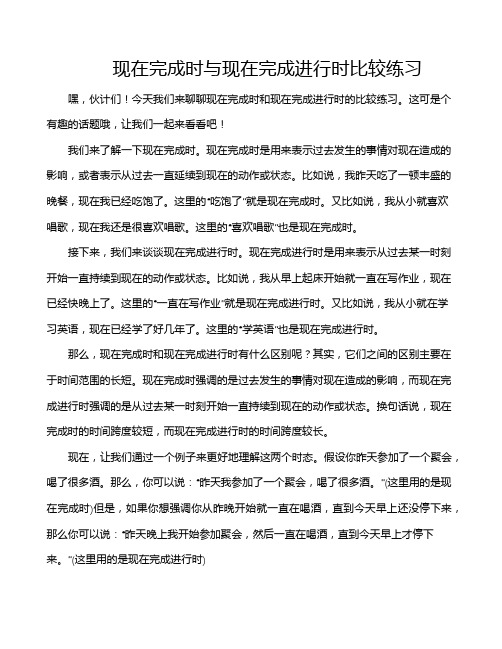
现在完成时与现在完成进行时比较练习嘿,伙计们!今天我们来聊聊现在完成时和现在完成进行时的比较练习。
这可是个有趣的话题哦,让我们一起来看看吧!我们来了解一下现在完成时。
现在完成时是用来表示过去发生的事情对现在造成的影响,或者表示从过去一直延续到现在的动作或状态。
比如说,我昨天吃了一顿丰盛的晚餐,现在我已经吃饱了。
这里的“吃饱了”就是现在完成时。
又比如说,我从小就喜欢唱歌,现在我还是很喜欢唱歌。
这里的“喜欢唱歌”也是现在完成时。
接下来,我们来谈谈现在完成进行时。
现在完成进行时是用来表示从过去某一时刻开始一直持续到现在的动作或状态。
比如说,我从早上起床开始就一直在写作业,现在已经快晚上了。
这里的“一直在写作业”就是现在完成进行时。
又比如说,我从小就在学习英语,现在已经学了好几年了。
这里的“学英语”也是现在完成进行时。
那么,现在完成时和现在完成进行时有什么区别呢?其实,它们之间的区别主要在于时间范围的长短。
现在完成时强调的是过去发生的事情对现在造成的影响,而现在完成进行时强调的是从过去某一时刻开始一直持续到现在的动作或状态。
换句话说,现在完成时的时间跨度较短,而现在完成进行时的时间跨度较长。
现在,让我们通过一个例子来更好地理解这两个时态。
假设你昨天参加了一个聚会,喝了很多酒。
那么,你可以说:“昨天我参加了一个聚会,喝了很多酒。
”(这里用的是现在完成时)但是,如果你想强调你从昨晚开始就一直在喝酒,直到今天早上还没停下来,那么你可以说:“昨天晚上我开始参加聚会,然后一直在喝酒,直到今天早上才停下来。
”(这里用的是现在完成进行时)现在完成时和现在完成进行时都是用来表示过去发生的事情对现在造成的影响或从过去某一时刻开始一直持续到现在的动作或状态。
它们的最大区别在于时间范围的长短。
希望通过今天的练习,大家对这两个时态有了更深入的了解!好了,今天的练习就到这里啦!希望大家都能把这些知识点运用到实际生活中去,提高自己的英语水平哦!下次再见啦,掰掰!。
现在完成时及现在完成进行时讲解及练习

时态练习(三)一.用since和for填空1.______two years2.____two years ago3.___last month4.______ 19995._______yesterday6._______ 4 o’clock7 4 hours 8._____an hour ago9.___we were children 10._____ lunch time11.____ she left here12. He has lived in Nanjing ___ the year before last.13. I’ve known him ______ we were children.14. Our teacher has studied Japanese ______ three years.15. She has been away from the city ______ about ten years.16. It’s about ten years __________ she left the city.二.单项选择。
1、Both his parents look sad . Maybe they ______what's happened to him .A. knewB. have knownC. must knowD.will know2、He has _______ been to Shanghai , has he ?A. alreadyB.neverC.everD.still3、Have you met Mr Li ______?A. justB. agoC.beforeD. a moment ago4、The famous writer _____ one new book in the past two year .A. is writingB.was writingC.wroteD.has written5、—Our country ______ a lot so far .—Yes . I hope it will be even ______ .A.has changed ; wellB.changed ; goodC.has changed ; betterD.changed ; better6、Zhao Lan ______already ______in this school for two years .A. was ; studyingB. will ; studyC. has ; studiedD. are ; studying7、We ______ Xiao Li since she was a little girl .A. knowB. had knownC. have knownD. knew8、Harry Potter is a very nice film .I______ it twice .A.will seeB.have seenC.sawD.see9、—These farmers have been to the United States .—Really ? When _____ there ?A. will they goB. did they goC. do they goD. have they gone10、—______ you ___ your homework yet ?—Yes . I _____ it a moment ago .A.Did ; do ; finishedB.Have ; done ; finishedC.Have ; done ; have finishedD.will ; do ; finish11、His father ______ the Party since 1978 .A. joinedB. has joinedC. was inD. has been in12、—Do you know him well ?— Sure .We _________ friends since ten years ago .A. wereB. have beenC. have becomeD. have made13、—How long have you ____ here ?—About two months .A. beenB. goneC. comeD. arrived14、Hurry up! The play __________ for ten minutes .A. has begunB. had begunC. has been onD. began15、It _____ ten years since he left the army .A. isB. hasC. willD. was16、 Miss Green isn't in the office . she_______ to the library .A.has goneB. wentC.will goD. has been17、My parents ______ Shandong for ten years .A. have been inB. have been toC. have gone toD. have been18.The students have cleaned the classroom, ?A. so theyB. don’t theyC. have theyD. haven’t they19、 has Mr White been a member of Greener China since he to China?A. How soon, comesB. How often, gotC. How long, cameD. How far, arrived20.When he arrived at the bus stop, the bus _____ for 20 minutes.A. has leftB. had leftC. has been awayD. had been away三.用never, ever, already, just, yet, for, since填空1. I have _______ seen him before, so I have no idea about him.2. Jack has _________ finished his homework.3. Mr. Wang has taught in this school ________ ten years.4. “Have you ________ seen the film?” “No, I have ________ seen it.”5. “Has the bus left _______?” “Yes, it has _________ left.”四.用适当的时态填空:1.She’s _____________ (live) here ever since she was ten.2.Both of them ________________ (be) in Hongkong for ten days.3.Both of them ____________ (come) to Hongkong ten days ago.4. Half an hour __________ (pass) since the train __________ (leave).5. Mary________(lose) her pen. ________ you _______(see) it here and there?6. _________ you _____ (find) your watch yet?7. ---Are you thirsty? ---No I _________just _________ (have) some orange.8. We already _________ (return) the book.9. ________ they _______ (build) a new school in the village?10. I _____________(not finish) my homework . Can you help me?11. My father _____ (read) the novel twice.12. I _________ (buy) a book just now.13. I _________ (lost ) my watch yesterday.14. My father ___________ (read) this book since yesterday.五.翻译下列句子:1.你曾经吃过鱼和薯条吗?2. 我刚刚丢了我的化学书。
现在完成进行时讲解及练习
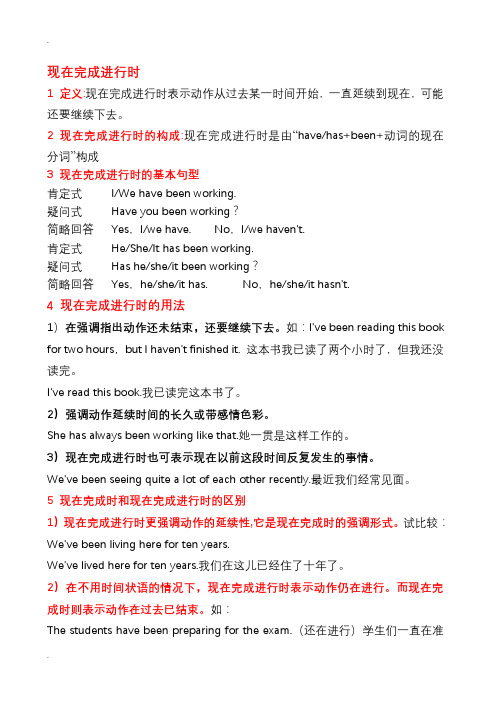
现在完成进行时1 定义:现在完成进行时表示动作从过去某一时间开始,一直延续到现在,可能还要继续下去。
2 现在完成进行时的构成:现在完成进行时是由“have/has+been+动词的现在分词”构成3 现在完成进行时的基本句型肯定式 I/We have been working.疑问式 Have you been working?简略回答 Yes,I/we have. No,I/we haven't.肯定式 He/She/It has been working.疑问式 Has he/she/it been working?简略回答 Yes,he/she/it has. No,he/she/it hasn't.4 现在完成进行时的用法1)在强调指出动作还未结束,还要继续下去。
如:I've been reading this book for two hours,but I haven't finished it. 这本书我已读了两个小时了,但我还没读完。
I've read this book.我已读完这本书了。
2)强调动作延续时间的长久或带感情色彩。
She has always been working like that.她一贯是这样工作的。
3)现在完成进行时也可表示现在以前这段时间反复发生的事情。
We've been seeing quite a lot of each other recently.最近我们经常见面。
5 现在完成时和现在完成进行时的区别1)现在完成进行时更强调动作的延续性,它是现在完成时的强调形式。
试比较:We've been living here for ten years.We've lived here for ten years.我们在这儿已经住了十年了。
2)在不用时间状语的情况下,现在完成进行时表示动作仍在进行。
(完整版)现在完成时讲解(含讲解及习题)(可编辑修改word版)
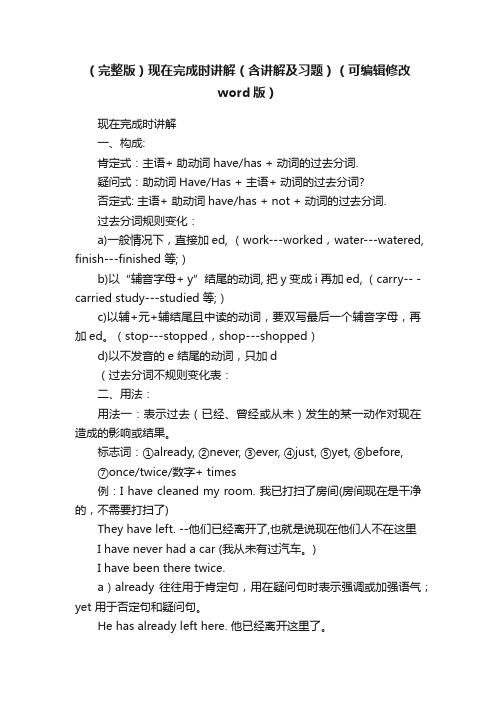
(完整版)现在完成时讲解(含讲解及习题)(可编辑修改word版)现在完成时讲解一、构成:肯定式:主语+ 助动词have/has + 动词的过去分词.疑问式:助动词Have/Has + 主语+ 动词的过去分词?否定式: 主语+ 助动词have/has + not + 动词的过去分词.过去分词规则变化:a)一般情况下,直接加ed, (work---worked,water---watered, finish---finished 等;)b)以“辅音字母+ y”结尾的动词, 把y 变成i 再加ed, (carry-- -carried study---studied 等;)c)以辅+元+辅结尾且中读的动词,要双写最后一个辅音字母,再加ed。
(stop---stopped,shop---shopped)d)以不发音的e 结尾的动词,只加d(过去分词不规则变化表:二、用法:用法一:表示过去(已经、曾经或从未)发生的某一动作对现在造成的影响或结果。
标志词:①already, ②never, ③ever, ④just, ⑤yet, ⑥before,⑦once/twice/数字+ times例:I have cleaned my room. 我已打扫了房间(房间现在是干净的,不需要打扫了)They have left. --他们已经离开了,也就是说现在他们人不在这里I have never had a car (我从未有过汽车。
)I have been there twice.a)already 往往用于肯定句,用在疑问句时表示强调或加强语气;yet 用于否定句和疑问句。
He has already left here. 他已经离开这里了。
Has he already left here? 他(真的)已经离开这里了吗?(表示加强语气)My teachers haven’t had breakfast yet. 我的老师们还没有吃早饭。
现在完成时与现在完成进行时比较练习
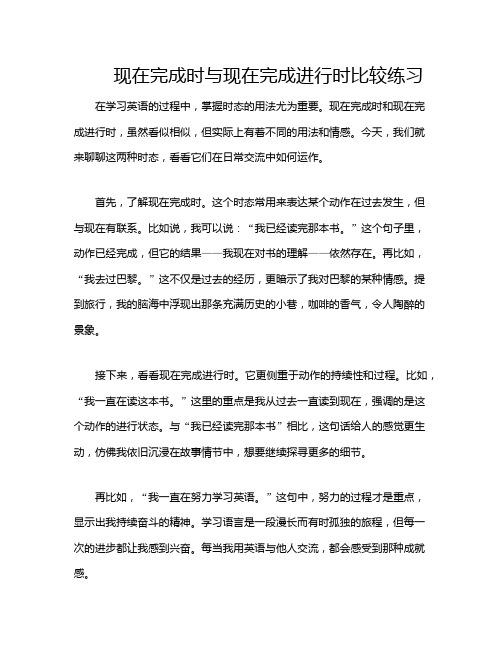
现在完成时与现在完成进行时比较练习在学习英语的过程中,掌握时态的用法尤为重要。
现在完成时和现在完成进行时,虽然看似相似,但实际上有着不同的用法和情感。
今天,我们就来聊聊这两种时态,看看它们在日常交流中如何运作。
首先,了解现在完成时。
这个时态常用来表达某个动作在过去发生,但与现在有联系。
比如说,我可以说:“我已经读完那本书。
”这个句子里,动作已经完成,但它的结果——我现在对书的理解——依然存在。
再比如,“我去过巴黎。
”这不仅是过去的经历,更暗示了我对巴黎的某种情感。
提到旅行,我的脑海中浮现出那条充满历史的小巷,咖啡的香气,令人陶醉的景象。
接下来,看看现在完成进行时。
它更侧重于动作的持续性和过程。
比如,“我一直在读这本书。
”这里的重点是我从过去一直读到现在,强调的是这个动作的进行状态。
与“我已经读完那本书”相比,这句话给人的感觉更生动,仿佛我依旧沉浸在故事情节中,想要继续探寻更多的细节。
再比如,“我一直在努力学习英语。
”这句中,努力的过程才是重点,显示出我持续奋斗的精神。
学习语言是一段漫长而有时孤独的旅程,但每一次的进步都让我感到兴奋。
每当我用英语与他人交流,都会感受到那种成就感。
我们还可以从情感上进一步探讨这两种时态。
现在完成时给人一种已经完成的满足感,仿佛我们拥有了一些宝贵的经历。
而现在完成进行时则更像是一条流动的河流,永不停息。
它捕捉了时间的流逝,带着我们的坚持与努力,仿佛在说:“这一路走来,我有多不容易。
”想象一下,和朋友聊天时,提到某个话题。
你可能会说:“我已经看过那部电影。
”这句用现在完成时,表达出你对这部电影的了解。
而朋友回应:“我一直在想去看那部电影。
”这时候,朋友用现在完成进行时,展现了他对这个电影的期待与渴望。
这种不同的时态运用,真能让对话更有趣。
让我们更深入一点,看看实际场景。
比如,在聚会上,有人问:“你最近在做什么?”你可能会用现在完成时回答:“我刚刚完成了一个项目。
”这句里,强调的是结果。
现在完成进行时讲解及练习题及答案

现在完成进行时讲解及练习题及答案什么是现在完成进行时?现在完成进行时是英语中的一种时态,用来表达一个动作或状态从过去某一时间开始一直持续到现在的情况。
这个时态可以用来描述动作的进行、状态的持续以及对现在产生的影响。
现在完成进行时的构成现在完成进行时的构成由"have been + 现在分词"组成。
其中,“have”是助动词,用于表示现在完成时;"been"是"be"的过去分词,表示进行或状态;现在分词则是动词-ing形式。
现在完成进行时的用法现在完成进行时通常用来描述以下情况:1. 一个动作或状态从过去某一时间开始,持续到现在,并可能还会继续下去。
例如:I have been studying English for three hours.(我已经学英语三个小时了,而且可能还会继续学下去。
)2. 表示对现在的影响。
例如:You look tired. Have you been working all day?(你看起来很累,你是不是一整天都在工作?)现在完成进行时的练题及答案1. 把下列句子改成现在完成进行时。
- He is reading a book. --> He has been reading a book.- They are playing football. --> They have been playing football.- She is studying for the exam. --> She has been studying for the exam.2. 写出下列动词的现在分词形式。
- read --> reading- play --> playing- study --> studying3. 根据括号内的提示,用现在完成进行时形式填空。
- I _______ (wait) for him for two hours. (wait)- She looks tired because she _______ (work) all day. (work)- They _______ (learn) Chinese for six months. (learn)答案:1.- He has been reading a book.- They have been playing football.- She has been studying for the exam.2.- reading- playing- studying3.- have been waiting- has been working- have been learning以上是现在完成进行时的讲解及一些练题及答案。
现在完成时及现在完成进行时讲解及练习

现在完成时讲解一、现在完成时的定义1、表示过去发生或已经完成的动作对现在造成的影响或结果,或从过去已经开始,持续到现在的动作或状态。
2、常用时间状语:recent ly, lately, since+时间点,for+数字+时间名词, in the past fewmonths/years等3、句子结构:肯定形式:have/has + done否定形式:have/has + not +done一般疑问句:have或h as放于句首肯定回答:Yes, 主语+have/has.否定回答:No, 主语+have’t/has’t.二.现在完成时的用法:其用法主要有三种I.“已完成”用法 :表示一个过去发生并结束的动作对现在造成的影响或结果。
这一类情况可以细致分为下述两种情况。
1)表示开始于过去的动作刚刚结束。
常和just,now,alread y,yet,not…yet等不确定的时间状语连用。
Li Ming has just turned off the light.李明刚刚把灯关上。
(说明现在灯关上了)I've finish ed my homewo rk now. 现在我已经做完作业了。
(说明可以交作业或做别的了)2)表示过去动作的结果,现在仍残留着。
一般不用时间状语。
I have lost my pen. 我把笔丢了。
(说明过去某时丢的,现在我还没找到这支笔)She has become a teache r. 她已经当了老师。
(说明她现在仍是老师)II.“未完成”用法。
表示动作或状态从过去某时开始,持续到现在,可能继续下去,也可能刚刚结束。
常和表示一段时间的状语连用。
如today,this week(month),lately,recent ly,thesedays,in the past few days,during the last two weeks,since,sinceyester day,since2 days ago,since1991,for a long time,for a month,so far,up to now,till(until)now等。
现在完成时与现在完成进行时态

一.核心语法【知识梳理】1.现在完成时【拓展】1)表示过去的动作对现在造成的影响或结果,着眼点在现在,常与already, yet, just ,before, lately, recently, never, ever, not yet等连用。
这个动作到说话时可能已经停止或结束。
He has turned off the light. 他已把灯关了。
His brother has joined the Party already.I have finished reading the book.We have just visited the farm.2)表示动作或状态在过去某时开始,一直持续到现在,并还可能继续下去的动作或状态。
通常用延续性动词。
常与段时间状语连用。
如:so far, up to now, since, for+一段时间,in/over /during the past/last few years等。
He has lived here since 1995. 自从1995年以来,他一直住在这儿。
I have not seen Justin since last Friday night. (从上周五晚上到现在一直都没有见过Justin)I have taught English for 15 years.Up to now, we have received no news from her.批注:现在完成时还可和包括“现在”在内的时间状语连用,如:today, this morning, this month, these days, this year等,表示这个动作在这个特定的时间内完成.Have you seen her these days?但如果说话人感兴趣的只是在这段时间内发生了某一动作,而不是这一动作与现在的关系时,须用过去时态。
The conference opened this month.3)在时间、条件、让步状语从句中,用现在完成时表示将来完成的动作。
现在完成时及现在完成进行时讲解及练习知识讲解

现在完成时及现在完成进行时讲解及练习现在完成时和现在完成进行时一.现在完成时的构成:助动词 have(has)+动词的过去分词构成。
has用于第三人称单数,have用于其他各种人称.二.现在完成时的用法:其用法主要有三种I.“已完成”用法 :表示一个过去发生并结束的动作对现在造成的影响或结果。
这一类情况可以细致分为下述两种情况。
1)表示开始于过去的动作刚刚结束。
常和just,just now连用。
Li Ming has just turned off the light. 李明刚刚把灯关上。
I've finished my homework just now. 我刚刚做完作业了。
2)表示过去动作的结果,现在仍残留着。
I have lost my pen. 我把笔丢了。
(说明过去某时丢的,现在我还没找到这支笔)She has become a teacher. 她已经当了老师。
(说明她现在仍是老师)II.“未完成”用法。
表示动作或状态从过去某时开始,持续到现在,可能继续下去,也可能刚刚结束。
常和段时间连用。
如lately,recently,these days,in the past few days,during the last two weeks,since,for +段时间,so far,up to now,till(until) now等。
He has lived here for 30 years. 他住在这儿三十年了。
(现在还住在这儿)They've known each other since childhood. 他们从小彼此相识。
(现在还在往来)How long have you studied English?你学英语多久了?(现在仍在学)III. 经验性用法:表示从过去开始到目前为止这段时间中反复发生的动作或多次出现的状态。
常与频度副词如,never,ever, already, yet,often,always,every week,twice等连用。
现在完成时及现在完成进行时讲解

一.现在完成时的构成:现在完成时由助动词have(has)+动词的过去分词构成。
has用于第三人称单数,have用于其他各种人称.二.现在完成时的用法:其用法主要有三种I.“已完成”用法 :表示一个过去发生并结束的动作对现在造成的影响或结果。
这一类情况可以细致分为下述两种情况。
1)表示开始于过去的动作刚刚结束。
常和just,now,already,yet,not…yet 等不确定的时间状语连用。
2)表示过去动作的结果,现在仍残留着。
一般不用时间状语。
II.“未完成”用法。
表示动作或状态从过去某时开始,持续到现在,可能继续下去,也可能刚刚结束。
常和表示一段时间的状语连用。
如today,this week (month),lately,recently,these days,in the past few days,during the last two weeks,since,since yesterday,since 2 days ago,since 1991,for a long time,for a month,so far,up to now,till(until)now等。
III.经验性用法:表示从过去开始到目前为止这段时间中反复发生的动作或多次出现的状态。
常与频度副词如often,always,every week,twice等连用。
三.现在完成时的时间状语I现在完成时属于现在时范围,故不能和过去的时间状语连用。
如:yesterday,last Sunday,in1990,three years ago等。
但是,在强调动作产生的后果和影响时,可以和一些表示不确定的时间状语连用。
a.用副词already和yet。
already一般用于肯定句中,yet一般用于否定句和疑问句中。
b.用ever和never.多用于否定或疑问句中,表示“曾经”或“从未“等。
c.用表示到说话为止的过去时间状语,如just, before, up to now, the past fewyears等。
- 1、下载文档前请自行甄别文档内容的完整性,平台不提供额外的编辑、内容补充、找答案等附加服务。
- 2、"仅部分预览"的文档,不可在线预览部分如存在完整性等问题,可反馈申请退款(可完整预览的文档不适用该条件!)。
- 3、如文档侵犯您的权益,请联系客服反馈,我们会尽快为您处理(人工客服工作时间:9:00-18:30)。
现在完成时由助动词 have(has)+动词的过去分词构成。
has用于第三人称单数,have用于其他各种人称.二.现在完成时的用法:其用法主要有三种I.“已完成”用法:表示一个过去发生并结束的动作对现在造成的影响或结果。
这一类情况可以细致分为下述两种情况。
1)表示开始于过去的动作刚刚结束。
常和just,now,already,yet,not…yet 等不确定的时间状语连用。
Li Ming has just turned off the light. 李明刚刚把灯关上。
(说明现在灯关上了)I've finished my homework now. 现在我已经做完作业了。
(说明可以交作业或做别的了)2)表示过去动作的结果,现在仍残留着。
一般不用时间状语。
I have lost my pen. 我把笔丢了。
(说明过去某时丢的,现在我还没找到这支笔)She has become a teacher. 她已经当了老师。
(说明她现在仍是老师)II.“未完成”用法。
表示动作或状态从过去某时开始,持续到现在,可能继续下去,也可能刚刚结束。
常和表示一段时间的状语连用。
如today,this week (month),lately,recently,these days,in the past few days,during the last two weeks,since,since yesterday,since 2 days ago,since 1991,for a long time,for a month,so far,up to now,till(until) now等。
He has lived here for 30 years. 他住在这儿三十年了。
(现在还住在这儿)They've known each other since childhood. 他们从小彼此相识。
(现在还在往来)How long have you studied English 你学英语多久了(现在仍在学)III.经验性用法:表示从过去开始到目前为止这段时间中反复发生的动作或多次出现的状态。
常与频度副词如often,always,every week,twice等连用。
I have been to the Summer Palace twice. 我曾经去过颐和园两次。
He has always said so.他总是这么说.三.现在完成时的时间状语I现在完成时属于现在时范围,故不能和过去的时间状语连用。
如:yesterday,last Sunday,in1990,three years ago等。
但是,在强调动作产生的后果和影响时,可以和一些表示不确定的时间状语连用。
a.用副词already和yet。
already一般用于肯定句中,yet一般用于否定句和疑问句中。
如:We have already finished our homework.我们已完成作业了。
They haven't finished their homework yet.他们还没有完成作业。
b.用ever和never.多用于否定或疑问句中,表示“曾经”或“从未“等。
如:-Have you ever been to the Great Wall你曾经去过长城吗-I have never been to the Great Wall.我从未去过长城。
c.用表示到说话为止的过去时间状语,如just, before, up to now, the pastfew years等。
例如:I have seen her before,but I can not remember where. 我以前见过她,但记不起在哪里见过。
He has been there three times the last few days. 近几天他去过那里三次了。
d.用包括“现在”在内的时间状语,如now,today,thismorning(month,year,term)等。
例如:-Have you met him today-No,I haven't. 今天你见过他吗我没有。
How many times have you been there this year 今年你去过那里多少次II短暂性动词不能和表一段时间的时间状语连用。
如:come, go, arrive, reach, hear, close, leave, begin, start, lose, buy, fall, join, die, get up等。
但如果要保留表一段时间的时间状语,必须将动词改为延续性动词。
现归纳总结一下由非延续性动词到延续性动词的转换如:fall asleep (ill) →be asleep (ill)get to know→ know begin,(start)→ be onopen →be open buy→ haveget up→ be up die→ be deadgo out→ be out come→ be inclose→be closed arrive→be herejoin→be in, be a +名词finish( end )→be overleave, move →be away,borrow →keepgo to school→be a student catch(a co ld)→ have(a cold)begin to study→study come back→be backput on→wear 或be on如:He has been a soldier for three years.他参军三年了。
His father has been dead for two years.他父亲去世二年了。
The film has been on for 5 minutes.电影已开始五分钟了。
We have studied English for three years. 我们(开始)学英语已三年了。
四.几点注意事项I. have been(to)与have gone( to)的区别:have been(to)表示“去过某地(现在已经回来了)”,可用于各人称;have gone(to)表示“去某地了(说话时某人不在当地)”,常用于第三人称,前者可与once ,never,several times等连用,后者则不能。
如:They have been to Beijing twice.他们去过北京两次。
He has gone to Beijing . 他去北京了。
II.不可延续性动词现在完成时的否定式,已变成一种可以延续的状态,因此可以和表示一段时间的状语连用。
如:I haven't left here since 1997.自从1997年以来,我一直没有离开过这儿。
(错)I have received his letter for a month.(对)I haven't received his letter for almost a month.练习一.用since和for填空years years agomonth 19994 o’clock7 4 hours hour agowere children lunch timeshe left here12. He has lived in Nanjing ___ the year before last.13. I’ve known him ______ we were children.14. Our teacher has studied Japanese ______ three years.15. She has been away from the city ______ about ten years.16. It’s about ten years __________ she left the city.二.单项选择。
1、Both his parents look sad . Maybe they ______what's happened to him .A. knewB. have knownC. must know know2、He has _______ been to Shanghai , has heA. already3、Have you met Mr Li ______A. justB. ago D. a moment ago4、The famous writer _____ one new book in the past two year .A. is writing writing written5、—Our country ______ a lot so far .—Yes . I hope it will be even ______ .changed ; well ; good changed ; better ; better6、Zhao Lan ______already ______in this school for two years .A. was ; studyingB. will ; studyC. has ; studiedD. are ; studying7、We ______ Xiao Li since she was a little girl .A. knowB. had knownC. have knownD. knew8、Harry Potter is a very nice film .I______ it twice .see seen9、—These farmers have been to the United States .—Really When _____ thereA. will they goB. did they goC. do they goD. have they gone10、—______ you ___ your homework yet—Yes . I _____ it a moment ago .; do ; finished ; done ; finished; done ; have finished ; do ; finish11、His father ______ the Party since 1978 .A. joinedB. has joinedC. was inD. has been in12、—Do you know him well— Sure .We _________ friends since ten years ago .A. wereB. have beenC. have becomeD. have made13、—How long have you ____ here—About two months .A. beenB. goneC. comeD. arrived14、Hurry up! The play __________ for ten minutes .A. has begunB. had begunC. has been onD. began15、It _____ ten years since he left the army .A. isB. hasC. willD. was16、 Miss Green isn't in the office . she_______ to the library .gone B. went go D. has been17、My parents ______ Shandong for ten years .A. have been inB. have been toC. have gone toD. have been students have cleaned the classroom,A. so theyB. don’t theyC. have theyD. haven’t they19、 has Mr White been a member of Greener China since he to ChinaA. How soon, comesB. How often, gotC. How long, cameD. How far, arrivedhe arrived at the bus stop, the bus _____ for 20 minutes.A. has leftB. had leftC. has been awayD. had been awayfactory ____ since the February of 1988.A . has been open B. has opened C. was open D. openedand Rose ____friends since they met in 2000.A. have madeB. have beenC. madeD. have becomemustn't_____ until he comes back.A. be awayB. leaveC. be leftmeeting _____ for a week now.A. has finishedB. has endedC. has been overGao ______ this school for nearly 5 years.A. has been inB. has come toC. has taught______ a teacher for 4 years .A. has beenB. has becomeC. wasD. became27. I ______ home for a week.A. have returnedB. have been backC. returned三.用never, ever, already, just, yet, for, since填空1. I have _______ seen him before, so I have no idea about him.2. Jack has _________ finished his homework.3. Mr. Wang has taught in this school ________ ten years.4. “Have you ________ seen the film” “No, I have ________ seen it.”5. “Has the bus left _______” “Yes, it has _________ left.”四.用适当的时态填空:’s _____________ (live) her e ever since she was ten.of them ________________ (be) in Hongkong for ten days.of them ____________ (come) to Hongkong ten days ago.4. Half an hour __________ (pass) since the train __________ (leave).5. Mary________(lose) her pen. ________ you _______(see) it here andthere6. _________ you _____ (find) your watch yet7. ---Are you thirsty ---No I _________just _________ (have) some orange.8. We already _________ (return) the book.9. ________ they _______ (build) a new school in the village10. I _____________(not finish) my homework . Can you help me11. My father _____ (read) the novel twice.12. I _________ (buy) a book just now.13. I _________ (lost ) my watch yesterday.14. My father ___________ (read) this book since yesterday.五、划线提问1) I have been there for two days.__________ _________ __________ you __________ __________2) My father has lived here since 2000._________ _________ __________ your father _________ __________3) He left here yesterday._________ ________ he _________ __________4) They bought a book two hours ago.__________ ___________ they __________ a book六.翻译下列句子:1.你曾经吃过鱼和薯条吗2. 我刚刚丢了我的化学书。
